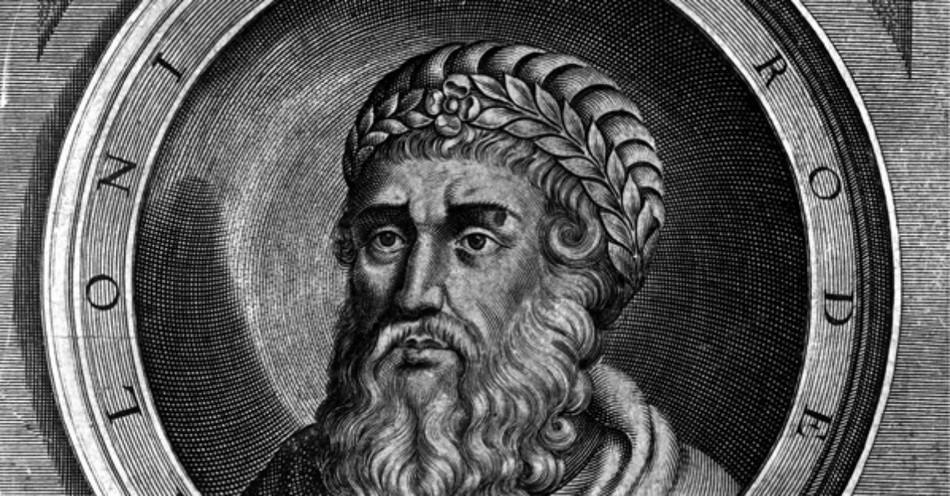King Herod I was a Roman Jewish client king of Judea, referred to as the Herodian kingdom. He is known for his colossal building projects throughout Judea, including his renovation of the Second Temple in Jerusalem and the development of the Temple Mount towards its north. Important details of his life are documented in the writings of the 1st-century Roman–Jewish historian Josephus.
King Herod was a shrewd and clever tyrant and a great builder. Today, roughly 2000 years later, the remains of his incredible structures, including his fortress of Masada, are still visible in Israel. He built Masada because he was afraid that someone would try to take his kingdom. He even had his own sons executed because he perceived them as a threat to his kingdom. It was said in Herod’s day, “Better to be one of Herod’s pigs than his sons.”
What Is King Herod Known for Outside the Bible?
Greg Laurie provides this perspective on Herod's reputation as an architect:
(Transcripted from the video above)
"In the story of the birth of Christ, we find a protagonist. He was worse than the Grinch or Scrooge because they are merely fictitious characters. This is a true historical person known as Herod the Great. His story is sold in Matthew chapter two.
A little background before we read the text together that will help us understand the state of mind of the man known as Herod. He came from a well-connected political family. He became the governor of Galilee at the age of 25, which was a very high position for such a young man. It was the desire of the Romans to control the Jewish people in the area. So they thought Herod was the man to do it because he was so tough and cruel. And they even voted in 40 BC to give him a title. Herod was identified as the king of the Jews, but in reality, he was the king of fools. He was a villain. He was mean. He was a murderer.
In fact, he was renowned for his cruelty. He had members of his own family put to death because he saw them as potential threats to his throne. His brother-in-law, his mother-in-law, two of his own sons, and even his wife were killed by Herod. Herod was sort of like Adolf Hitler or a Saddam Hussein or Muammar Kaddafi. He murdered out of spite and killed to stay in power. Life meant nothing to him.
Josephus, the ancient historian, describes, "Herod the Great is barbaric." And no doubt he had spies out everywhere, keeping watch for any potential cues. He didn't want anyone to take his place. However, Herod was also clever. He wanted to stay in power. So during tough economic times, he returned the tax money collected for the temple. And during a famine 25 BC, he melted down gold objects in his palace to buy food for the poor, but that was just a ruse. He was preoccupied with his power and his possessions, and he wanted it all.
Now, Herod is known as the great because he was a builder. No one built buildings like Herod. He built seven palaces and seven theaters, one of which seated 9,500 people. He built stadiums for sporting events. The largest could hold 300,000 fans. He built the port city of Caesarea, named in honor of Caesar Augustus, a place that we visit when we go to Israel, a gorgeous spot. And I was able to stand in the actual amphitheater that Herod built and that the Apostle Paul preached in. But one of his greatest buildings was a place known as Masada. That was the winter palace of Herod. When it got cold in Jerusalem, he would go off to Masada. That was this magnificent edifice. Really, an impregnable fortress that had a swimming pool and a sauna in it.
But Herod's greatest accomplishment in the area of building was the temple. It was the second temple, the first built by Solomon, the second by Herod. 46 years it took to build this amazing building, which became one of the wonders of the ancient world. And that's why everyone was shocked when Jesus said, "Not one stone will be left upon another that will not be taken down."
("Who Was King Herod?" first published on Christianity.com on January 10, 2012)
King Herod in the Bible
The Visit of the Wise Men
Now after Jesus was born in Bethlehem of Judea in the days of Herod the king, behold, wise men from the east came to Jerusalem, saying, "Where is the one who has been born king of the Jews? We saw his star when it rose and have come to worship him."
Then Herod summoned the wise men secretly and ascertained from them what time the star had appeared. And he sent them to Bethlehem, saying, "Go and search diligently for the child, and when you have found him, bring me word, that I too may come and worship him." After listening to the king, they went on their way. And behold, the star that they had seen when it rose went before them until it came to rest over the place where the child was. When they saw the star, they rejoiced exceedingly with great joy. And going into the house they saw the child with Mary his mother, and they fell down and worshiped him. Then, opening their treasures, they offered him gifts, gold and frankincense and myrrh. And being warned in a dream not to return to Herod, they departed to their own country by another way. (Matthew 2:1-12)
The Flight to Egypt
Now when they had departed, behold, an angel of the Lord appeared to Joseph in a dream and said, "Rise, take the child and his mother, and flee to Egypt, and remain there until I tell you, for Herod is about to search for the child, to destroy him." And he rose and took the child and his mother by night and departed to Egypt and remained there until the death of Herod. This was to fulfill what the Lord had spoken by the prophet, "Out of Egypt I called my son." (Matthew 2:13-15)
Herod Kills the Children
Then Herod, when he saw that he had been tricked by the wise men, became furious, and he sent and killed all the male children in Bethlehem and in all that region who were two years old or under, according to the time that he had ascertained from the wise men. Then was fulfilled what was spoken by the prophet Jeremiah: "A voice was heard in Ramah, weeping and loud lamentation, Rachel weeping for her children; she refused to be comforted, because they are no more." (Matthew 2:16-18)
The Return to Nazareth
But when Herod died, behold, an angel of the Lord appeared in a dream to Joseph in Egypt, "Rise, take the child and his mother and go to the land of Israel, for those who sought the child's life are dead." And he rose and took the child and his mother and went to the land of Israel. But when he heard that Archelaus was reigning over Judea in place of his father Herod, he was afraid to go there, and being warned in a dream he withdrew to the district of Galilee. And he went and lived in a city called Nazareth, that what was spoken by the prophets might be fulfilled: "He shall be called a Nazarene." (Matthew 2:19-23)
The New King: Jesus Christ
When wise men from the East came to Jerusalem asking, “Where is He who has been born King of the Jews?” (Matthew 2:2), Herod suddenly realized there was another king in town. The Bible says Herod was troubled. He told them, “When you have found Him, bring back word to me, that I may come and worship Him also” (Matthew 2:8). Just as the wise men were true worshipers, Herod was a false one. He was hostile toward God, yet he masqueraded as a worshiper of Him.
Don't Be King Herod
Herods by the dozens sit in the pews of many churches today. Outwardly, they appear devout and deeply religious, but inwardly they are living a lie. They don’t know God. They don’t have a relationship with Him. They may sing the songs and give to the offering. They may do all the right things, but it doesn’t mean they are true worshipers because God looks at the heart.
If your life is not right with God when you come to worship Him, it fails to please God and is offensive to Him. What does God see in your heart? There are plenty of false worshipers today. Are you a true one?
Taken from "True Worshipers" by Harvest Ministries (used by permission).
Did King Herod tax the order of Rome?
The objection is vigorously urged that Herod was a rex socius — an allied king and that all taxes in his dominion must have been levied by himself. But it is difficult to see how Herod was entitled, in fact, to be called a rex socius, since the term means one allied, in commercial language, a partner. Herod was wholly the creature of Augustus, set initially as king, not as having any hereditary claims or being even of Jewish descent, but because he could be a useful instrument in the hands of the Romans. He was hated by the Jews both as an alien and as of a cruel and despotic nature, and he held the throne only through the fear that the Roman support inspired. Josephus mentions many instances, showing how far he was subjected all his reign to the emperor and his representatives, the governors of Syria. A clear proof of this is seen in the fact that the Jews were forced to take the oath of allegiance to Augustus and Herod. (Joseph., Antiq., xvii. 2. 4.)
To say, then, that Augustus would, from regard to any royal rights of Herod, make him an exception and not carry out his general policy of taxation in his dominions is to make the Roman ruler a constitutional monarch and to attribute to him a softness of disposition which is indicated by no other acts of his public life. And there may have been particular reasons why, before the death of Herod, known to be near his end, and his sons quarreling about the succession, Augustus should have had this enrollment made; for he must have foreseen the probability if he had not already formed the determination, that his kingdom should speedily be made a Roman province.
Adapted from The Life of Our Lord upon the Earth by Samuel James Andrews.
Photo Credit: WikiMediaCommons/publicdomain
This article is part of our People of Christianity catalog that features the stories, meaning, and significance of well-known people from the Bible and history. Here are some of the most popular articles for knowing important figures in Christianity:
How Did the Apostle Paul Die?
Who are the Nicolaitans in Revelation?
Who Was Deborah in the Bible?
Who Was Moses in the Bible?
King Solomon's Story in the Bible
Who Was Lot's Wife in the Bible?
Who Was Jezebel in the Bible?
Who Was the Prodigal Son?



